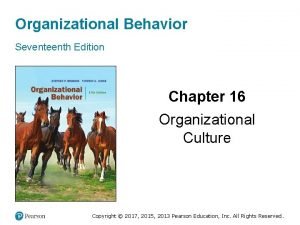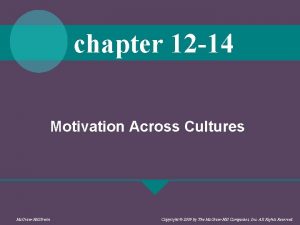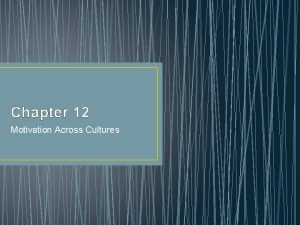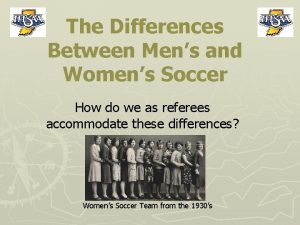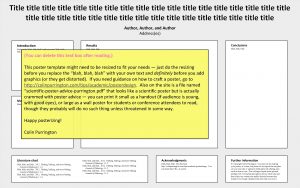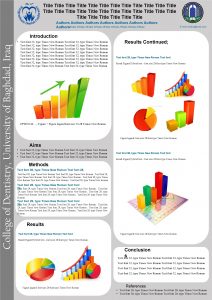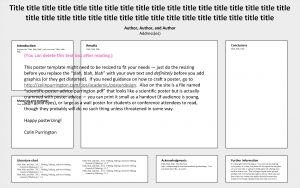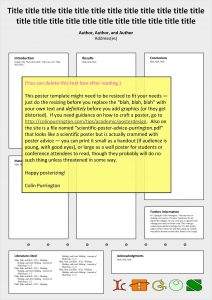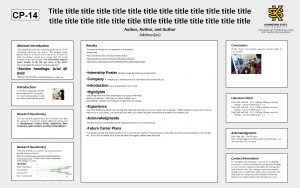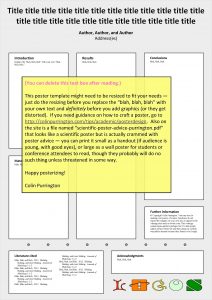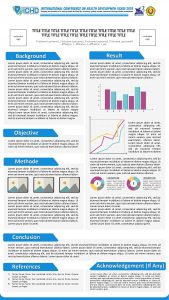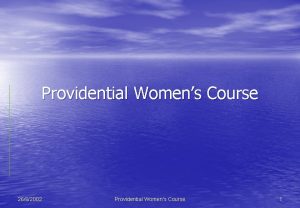Womens Writings Across Cultures Course Title Womens Writings













- Slides: 13

Women’s Writings Across Cultures Course Title : Women’s Writings Across Cultures M. A English Semester -III Coordinator: Dr. Vandana Sharma

Introduction to Feminism � A political, cultural or economic movement aimed at establishing equal rights and legal protection for women. � Involves political and sociological theories and philosophies concerned with issues of gender difference � Advocates gender equality for women and campaigns for women's rights and interests.

Issues �Altered predominant perspectives in a wide range of areas within Western society, ranging from culture to law. � Feminist activists have campaigned for women's legal rights (rights of contract, property rights, voting rights); for women's right to bodily integrity and autonomy, for abortion rights, and for reproductive rights (including access to contraception and quality prenatal care); for protection of women and girls from domestic violence, sexual harassment and rape; for workplace rights, including maternity leave and equal pay; against misogyny; and against other forms of gender-specific discrimination against women.

Three waves of Feminism. According to Maggie Humm and Rebecca Walker, the history of feminism can be divided into three waves. The first feminist wave - the 19 th and early 20 th centuries The second wave - 1960 s and 1970 s Third wave - extends from the 1990 s to the present. Feminist theory emerged from these feminist movements. It is manifest in a variety of disciplines such as feminist geography, feminist history and feminist literary criticism.

Genesis of Women’s Writings �In the West, second-wave feminism prompted a general reevaluation of women's historical contributions, and various academic sub-disciplines, such as Women's history (or herstory) and women's writing, developed in response to the belief that women's lives and contributions have been underrepresented as areas of scholarly interest.

Introduction to Women’s Writings �The academic discipline of Women's Writing as a discrete area of literary studies is based on the notion that the experience of women, historically, has been shaped by their gender, and so women writers by definition are a group worthy of separate study: �Women's writing as an area of study has been developing since the 1970 s.

History of 18 th century women’s writings � George Ballard's Memoirs of Several Ladies of Great Britain Who Have Been Celebrated for their Writing or Skill in the Learned Languages, Arts, and Sciences (1752) � John Duncombe's Feminiad, a catalogue of women writers; Similarly, women have been treated as a distinct category by various misogynist writings, perhaps best exemplified by Richard Polwhele's The Unsex'd Females, a critique in verse of women writers at the end of the 18 th century with a particular focus on Mary Wollstonecraft and her circle.

Mary Wollstonecraft (1759 – 1797) �Wollstonecraft - English writer, philosopher, and advocate of women's rights is regarded as one of the founding feminist philosophers. �Best known for A Vindication of the Rights of Woman (1792), in which she argues that women are not naturally inferior to men, but appear to be only because they lack education. She suggests that both men and women should be treated as rational beings and imagines a social order founded on reason.

A Vindication of the Rights of Woman �- A reaction to the French Revolutionary Assembly’s Declaration of the Rights of Man which granted participatory citizenship only to men. �The “Rights of Man” meant a fraternity of “liberty, fraternity, equality” only for men, comparing marriage to slavery and tyrannical oppression. �Wollstonecraft challenges the thinking that sustains and idealizes this subjection: it questions the view of woman’s subordination as a fact of nature, history, philosophy, and divine ordination.

Virginia Woolf (1882 – 1941) was an English writer, considered one of the most important modernist 20 th-century authors and also a pioneer in the use of stream of consciousness as a narrative device.

A Room of One's Own (1929), �A key work of feminist literary criticism � Written following two lectures she delivered on "Women and Fiction" at Cambridge University the previous year. �Examines the historical disempowerment women have faced in many spheres, including social, educational and financial. �“Shakespeare’s Sister” is an extract taken from “A Room of Ones Own. ” "A woman must have money and a room of her own if she is to write fiction"

Shakespeare’s Sister �Explores the plight of women in society in England during the 15 th and 16 thcenturies. �Through a subtle analysis, Woolf raises certain concerns regarding discrimination against women in a male dominated society, such as denial of education to the girl-child, violence against women, the need for freedom of expression in women, and the right to human dignity and equality.

Text Reading & Discussion
 Organizational behavior
Organizational behavior Communicating across cultures ppt
Communicating across cultures ppt Motivation across cultures
Motivation across cultures Body language across cultures respuestas
Body language across cultures respuestas Motivation across cultures
Motivation across cultures Recreational activities across cultures and genders
Recreational activities across cultures and genders Motivation across cultures
Motivation across cultures Course title and course number
Course title and course number Intertestamental period
Intertestamental period Refers to writings in which expression and form
Refers to writings in which expression and form Historians value the writings of ibn battuta because he -
Historians value the writings of ibn battuta because he - Example of formal writing and informal writing
Example of formal writing and informal writing Difference between mens and womens soccer
Difference between mens and womens soccer Mens lacrosse helmet
Mens lacrosse helmet
